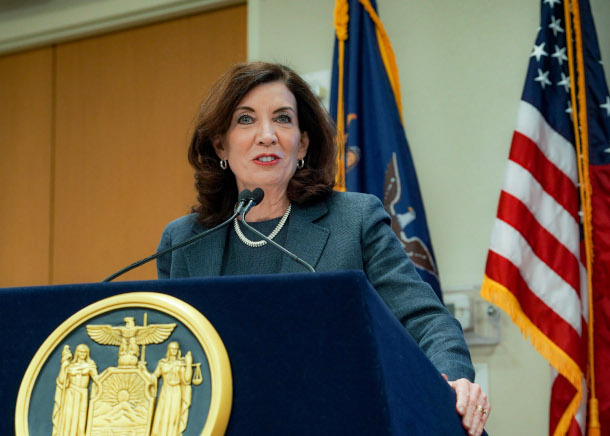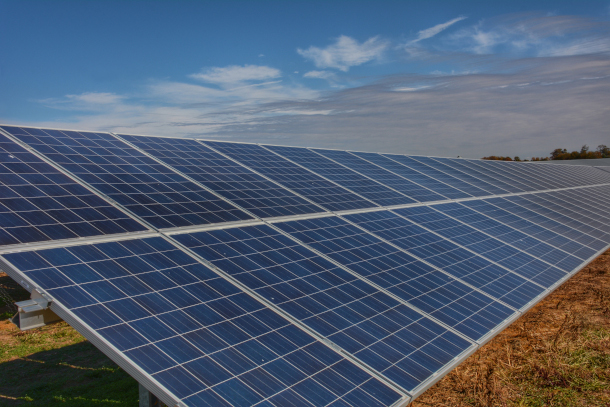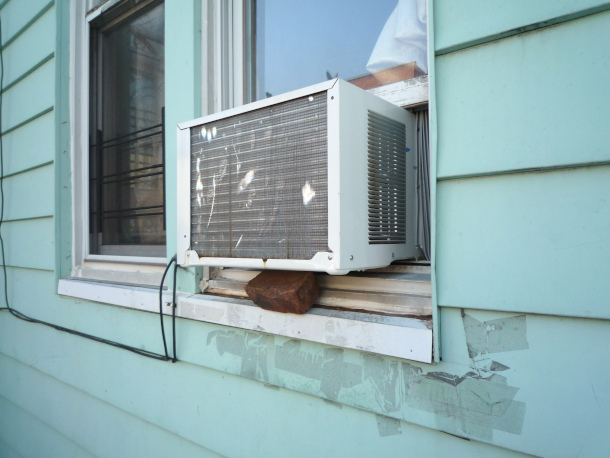Power to the People
Air Date: Week of May 19, 2023

Grassroots organizers worked hard to convince New York Governor Hochul and other lawmakers to include the Build Public Renewables Act in the most recent state budget. (Photo: Metropolitan Transportation Authority, Flickr, CC BY 2.0)
New York state has adopted a new law aimed at using federal funds to boost public power from renewables and shut down six polluting “peaker” gas power plants. Lee Ziesche, a spokesperson for Public Power New York, joins Host Jenni Doering to discuss how it will lower electricity rates and boost public health, environmental justice, and energy access.
Transcript
CURWOOD: From PRX and the Jennifer and Ted Stanley Studios at the University of Massachusetts Boston, this is Living on Earth. I’m Steve Curwood.
DOERING: And I’m Jenni Doering.
Decades ago, deregulation laws uncoupled electric power generation from the system of wires that delivers electricity to our homes and businesses, with the promise of lower prices through competition. But instead of making electricity cheaper this made it almost impossible for nonprofit municipal power companies to build and operate plants, and led to price volatility, including the surge from 12 cents to $9 a kilowatt hour that some utilities in Texas charged during a 2021 winter storm. The recently enacted Inflation Reduction Act is starting to change all that, and New York state is among the first jurisdictions to take advantage with legislation aimed at using federal funds to boost public power from renewables. To achieve its goal of 100% zero-emission electricity by 2040 the Empire state recently enacted the Build Public Renewables Act as part of the latest state budget, to allow nonprofit power producers to go into business. The measure also sets clean energy requirements for the New York Power Authority, or NYPA, and directs it to shut down six highly polluting natural gas “peaker” plants in greater New York City. Lee Ziesche is a spokesperson for Public Power New York.
ZIESCHE: So since they weren't allowed to build these projects, New York has been missing out on over a billion dollars of money from the IRA. But one of the things that are really great about the IRA is it does allow nonprofits to receive these funds through direct pay, to build and own renewable energy projects to build and own transmission. And so now, you know, I think there were a lot of different things that, you know, convinced the governor of New York, Governor Hochul, to get on board with Build Public Renewables, because she was not really on board with it last year. But once the Inflation Reduction Act passed, you know, they realized there's this ton of money that's sitting on the table.
DOERING: Yeah. So one of the key parts of the Act will require the state of New York to shut down those gas-fired power plants, or peaker plants, by 2030. What are the health risks associated with those plants? And where are they located?
ZIESCHE: Yeah, so they're almost all located in black and brown working class communities in New York City. There's also two peaker plants on Long Island, as well. And so they turn on, you know, when New York City needs the most energy, which is the hottest days of the year. And we know that fracked gas is horrible for people's health. It does create that small particulate matter, which is one of those things that, you know, creates smog. And communities like the South Bronx, where some of these power plants are located, also have highways that create a lot of pollution. They also have trucking facilities and waste facilities. And then we know gas by itself, you know, when it comes into people's homes, is full of carcinogens, things like benzene. So the combination of all these different pollutants create some of the worst air in the country. Some of these communities have some of the highest asthma rates in the entire country. And these are communities that have been dumped on for a long time. They've been considered expendable, because you know, they are low income communities, they're communities of color.

The Build Public Renewables Act requires the New York Power Authority to generate all its electricity from renewable sources by 2030. (Photo: UD Cooperative Extension, Flickr, CC BY 2.0)
DOERING: Well, what will the New York Power Authority replace those peaker plants with in order to meet demand, especially at these times of peak demand?
ZIESCHE: Most likely, in New York City, these locations might be great places now to build battery storage, and then upstate as well, they will be able to be building wind, they'll be able to build solar, you know, at utility scale, to replace these power plants that are being shut down. And another thing that we're really hoping that NYPA will be able to do is they're also able to build, you know, transmission and interconnection with substations, because that right now, is something that is limiting how much renewable energy is being built in New York State. You know, there's entire tracts of the state where nothing is being built, because in order to build a lot of renewable energy, there needs to be a lot of upgrades to the grid. And private companies don't want to do that, right? You know, that really cuts into their profit, if they have to build up all this additional infrastructure. So what we're hoping NYPA does is really focus on areas because they're able to do the transmission and the building of renewable energy. So it will not only allow for more public power to come on board, but it will actually open up parts of the state for the private market as well. And, you know, obviously, we want as much of the renewable energy being built in the state to be publicly owned as possible. But you know, we're also very realistic and realize that we do have a very short amount of time to scale up and build all this renewable energy that we need. So it will allow the private market as well to build in areas that were previously just unaffordable for them.
DOERING: Now, as we make this transition from fossil fuel energy to renewables, a lot of people in the industry and in fossil fuels are worried that they'll lose their jobs. How will this legislation address those concerns?
ZIESCHE: Yeah, you know, I mean, that is a very legitimate concern, and something that we wanted to make sure that we addressed. And so the bill does create the Office of Just Transition, and provides $25 million per year to retrain these workers. So that, you know, people who were previously working, say in the fracked gas power plants, will be retrained to either be, you know, building renewable energy, installing solar. And it's going to make sure that as we are building out this new energy system, that these are union jobs that are paying prevailing wage. So making sure that these workers are taken care of and not left behind was very important. And we're very happy to make sure that that ended up in the final bill and made it through budget negotiations.

High energy costs often prevent people from using air conditioning, even in dangerous heat conditions. (Photo: Jason Eppink, Flickr, CC BY 2.0)
DOERING: So talk to me about the money here. To what extent can publicly owned power utilities help actually lower energy bills for low income ratepayers?
ZIESCHE: Unfortunately, in New York and across a lot of the country, you know, there's been a dominating kind of philosophy that the free market can solve climate change. And not only are we seeing that they're not building renewable energy fast enough, we are also seeing that some of these projects that are coming online are very expensive, because the private market, you know, has this profit incentive. And with NYPA, that's not the case, you know, there is no profit incentive. So through things like the Inflation Reduction Act, also, because NYPA is able, they have a great bond rating, they're able to get pretty low cost financing, they will be able to build these projects, and then provide low cost energy for the people who need it most. And that is another part of the bill that actually, you know, requires them to provide affordable energy to disadvantaged communities, which, again, is the term that New York uses for environmental justice communities. Also, we're hoping that this will have an impact as well on the private market, because right now, they're not competing with public power. And soon, you know, private energy developers will have to compete with NYPA, which will hopefully drive down their prices as well, you know, making sure that this is affordable to everybody.
DOERING: Yeah, when those prices skyrocket, the lower income people, disadvantaged communities, start to have to ration the energy that they're using. To what extent can that be really dangerous for people?
ZIESCHE: Yeah, I mean, it's awful. If you're in the summer, and you don't feel like you can turn on your AC because your Con Ed bill is going to be so unaffordable, you know, people die, people get overheated. And we even see this in the winter to a certain extent, as well. A lot of times there are people who, their heat systems like actually don't work very well. And, you know, I interviewed somebody once who talked about how he was heating his home with his gas stove, because the heating was so expensive, and it was like cheaper to do it that way. And we know that's creating so much pollution in people's homes. And we know that those extremes, right, those really, really hot days, or those really cold days are only going to get worse as the climate crisis moves forward. So making sure that people have access to, you know, affordable energy is necessary for survival. And, you know, we believe that energy is a human right, you know, which is why we've been fighting for public power. We don't believe it's something that people should be profiting off of, or that people should be denied energy just so some company can make, you know, millions of dollars of profit. And I think hopefully, you know, as we've passed this now in New York, you know, we can show it as a model like, okay, this is working. You know, as we build up these plants as people's bills go lower, hopefully, this will be a model that shows people that yes, there can be another way. Because unfortunately, I think a lot of people get stuck in the mindset like, okay, this is the way it is. And these people are so powerful. We can't take them on. But we can, and it feels very powerful to take back your power in this way.
DOERING: Lee Ziesche is a spokesperson for Public Power New York, a grassroots coalition that's been working to pass the Build Public Renewables Act. Thank you so much, Lee.
ZIESCHE: Thank you guys. Thanks so much for your time and for covering this.
Links
Public Power New York | “New Yorkers Win Historic Victory for Public Power”
New York State Senate | “Build Public Renewables Act”
New York State Senate | “State Budget”
The Guardian | “New York Takes Big Step Toward Renewable Energy in ‘Historic’ Climate Win”
Living on Earth wants to hear from you!
Living on Earth
62 Calef Highway, Suite 212
Lee, NH 03861
Telephone: 617-287-4121
E-mail: comments@loe.org
Newsletter [Click here]
Donate to Living on Earth!
Living on Earth is an independent media program and relies entirely on contributions from listeners and institutions supporting public service. Please donate now to preserve an independent environmental voice.
NewsletterLiving on Earth offers a weekly delivery of the show's rundown to your mailbox. Sign up for our newsletter today!
 Sailors For The Sea: Be the change you want to sea.
Sailors For The Sea: Be the change you want to sea.
 The Grantham Foundation for the Protection of the Environment: Committed to protecting and improving the health of the global environment.
The Grantham Foundation for the Protection of the Environment: Committed to protecting and improving the health of the global environment.
 Contribute to Living on Earth and receive, as our gift to you, an archival print of one of Mark Seth Lender's extraordinary wildlife photographs. Follow the link to see Mark's current collection of photographs.
Contribute to Living on Earth and receive, as our gift to you, an archival print of one of Mark Seth Lender's extraordinary wildlife photographs. Follow the link to see Mark's current collection of photographs.
 Buy a signed copy of Mark Seth Lender's book Smeagull the Seagull & support Living on Earth
Buy a signed copy of Mark Seth Lender's book Smeagull the Seagull & support Living on Earth

